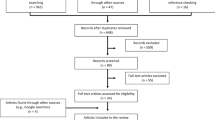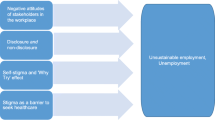Abstract
Background
There is increasing recognition of the importance of psychiatric vocational rehabilitation (PVR) programmes in helping individuals with severe mental illnesses to find and secure jobs. However, little is known concerning the factors related to PVR outcomes.
Objective
This review identifies those person-related factors which most strongly influence employment outcomes after participation in PVR programmes.
Method
Medline, Psychinfo, Pubmed and CINAHL were searched for studies using multivariate analysis of longitudinal data, which analysed employment outcomes after at least 6 months of programme participation, and which analysed at least three predictor domains.
Results
Eight studies presented in 16 publications met all the criteria. Better employment outcomes were most strongly related to better work performance measured during PVR participation and to higher work-related self-efficacy. Better social functioning during PVR participation was also significantly related to positive employment outcomes, but this relationship was generally weaker than those of the two aforementioned factors. In most studies, employment outcomes after PVR were not related to past functioning, including work history and diagnosis. Findings on the severity of psychiatric symptoms measured during PVR were mixed. In terms of contribution to outcome, severity of symptoms usually ranked below work performance, when measured concurrently.
Conclusion
Contrary to previous reviews, this study suggests that the influence of past functioning, including work history, diagnosis and psychiatric history, is outweighed by work performance in PVR. Further prospective and controlled studies are needed to reach more definite conclusions about the individual contributions of person-related factors.
Similar content being viewed by others
References
Mueser KT, Clark RE, Haines M, et al. (2004) The Hartford study of Supported Employment for persons with severe mental illness. J Consult Clin Psychol 72:479–490
Twamley EW, Jeste DV, Lehman AF (2003) Vocational Rehabilitation in Schizophrenia and Other Psychotic Disorders. J Nerv Ment Dis 191:515–523
Lehman AF, Goldberg R, Dixon LB, et al. (2002) Improving employment outcomes for persons with severe mental illnesses. Arch Gen Psychiatry 59:165–172
Crowther R, Marshall M, Bond GR, et al. (2001) Helping people with severe mental illness to obtain work: systematic review. BMJ 322:204–208
Crowther R, Marshall M, Bond GR, Huxley P (2004) Vocational rehabilitation for people with severe mental illness (Cochrane Review). The Cochrane Library [1] John Wiley and Sons, Ltd., Chichester UK
Drake RE, McHugo GJ, Bebout R, et al. (1999) A randomized clinical trial of supported employment for inner-city patients with severe mental disorders. Arch Gen Psychiatry 56:627–633
Drake RE, McHugo GJ, Becker DR, et al. (1996) The New Hampshire study of supported employment for people with severe mental illness. J Consult Clin Psychol 64:391–399
Macias C, DeCarlo LT, Wang Q, et al. (2001) Work interest as a predictor of competitive employment: policy implications for psychiatric rehabilitation. Adm Policy Ment Health 28:279–297
Danley KS, Sciarappa K, MacDonald-Wilson K (1992) Chooseget-keep: a psychiatric rehabilitation approach to supported employment. In: Liberman RP (ed) Effective psychiatric rehabilitation, Jossey-Bass Publishers, San Francisco
Anthony W, Cohen M, Farkas M, et al. (2002) Psychiatric Rehabilitation. 2nd edition, Center for Psychiatric Rehabilitation, Boston
Boardman J, Grove B, Perkins R, et al. (2003) Work and employment for people with psychiatric disabilities. Br J Psychiatry 182:467–468
Mintz J, Bond GR, Mintz LI (1999) Assessing work function in mental health research, in Cost effectiveness of psychotherapy. A guide for practitioners, researchers and policymakers, Edited by Miller NE, MacGruder K, Oxford University Press New York
Bolton BF, Bellini JL, Brookings JB (2000) Predicting client employment. Rehabilitation Counseling Bulletin 44:10–21
Marwaha S, Johnson S (2004) Schizophrenia and employment; A review. Soc Psychiatry Psychiatr Epidemiol 39:337–349
Cook JA, Razzano L (2000) Vocational Rehabilitation for Persons with Schizophrenia: Recent Research and Implications for Practice. Schizophr Bull 26:87–103
Tsang H, Lam P, Ng B, et al. (2000) Predictors of Employment Outcome for People with Psychiatric Disabilities:A Review of the Literature Since the Mid ’80s. Journal of Rehabilitation 66:19–31
Weeghel Jv (1997) Persoonsgebonden factoren als predictoren van arbeidsparticipatie bij psychiatrische patiënten; een overzicht van de onderzoeksliteratuur. Tijdschrift voor Sociale Geneeskunde 75:339–347
Lehman AF (1995) Vocational rehabilitation in schizophrenia. Schizophr Bull 21:645–656
Anthony WA (1994) Characteristics of people with psychiatric disabilities that are predictive of entry into the rehabilitation process and successful employment. Psychosoc Rehabil J 17:3–13
McGurk SR, Mueser KT (2004) Cognitive functioning, symptoms, and work in Supported Employment: a review and heuristic model. Schizophr Res 70:147–173
Cook JA, Razzano L (1994) Predictive validity of the McCarron-Dial testing battery for employment outcomes among psychiatric rehabilitation clientele. Vocational Evaluation and Work Adjustment Bulletin 27:39–47
Cook JA, Rosenberg H (1994) Predicting community employment among persons with psychiatric disability: a logistic regression analysis. J Rehabil Admin 18:6–22
Cook JA, Razzano L (1995) Discriminant function analysis of competitive employment outcomes in a transitional employment program for persons with severe mental illness. J Vocational Rehabil 5:127–139
Xie HY, Dain BJ, Becker DR, et al. (1997) Job tenure among persons with severe mental illness. Rehabil Counseling Bull 40:230–239
Becker DR, Drake RE, Bond GR, et al. (1998) Job terminations among persons with severe mental illness participating in supported employment. Community Ment Health J 34:71–82
Hoffmann H, Kupper Z (1997) Relationships between social competence, psychopathology and work performance and their predictive value for vocational rehabilitation of schizophrenic outpatients. Schizophr Res 23:69–79
Hoffmann H, Kupper Z, Kunz B (2000) Hopelessness and its impact on rehabilitation outcome in schizophrenia—an exploratory study. Schizophr Res 43:147–158
Hoffmann H, Kupper Z, Zbinden M, et al. (2003) Predicting vocational functioning and outcome in schizophrenia outpatients attending a vocational rehabilitation program. Soc Psychiatry Psychiatr Epidemiol 38:76–82
Hoffmann H, Kupper Z (2003) Prädiktive Faktoren einer erfolgreichen beruflichen Wiedereingliederung von schizophrenen Patienten/Predictive factors of successful vocational reintegration in patients with chronic schizophrenia. Psychiatrische Praxis 30:312–317
Rogers ES, Anthony WA, Cohen M, et al. (1997) Prediction of vocational outcome based on clinical and demographic indicators among vocationally ready clients. Community Ment Health J 33:99–112
Reker T, Eikelmann B (1998) Krankheits- und Rehabilitationsverläufe schizophrener Patienten in ambulanter Arbeitstherapie: eine prospektive Studie über 3 Jahre. Nervenarzt 69:210–218
Reker T, Eikelmann B (1999) Prädiktoren einer erfolgreichen beruflichen Eingliederung; Ergebnisse einer prospectiven Studie. Psychiat Prax 26:218–233
Regenold M, Sherman MF, Fenzel M (1999) Getting back to work: self-efficacy as a predictor of employment outcome. Psychiatr Rehabil J 22:361–367
Jones CJ, Perkins DV, Born DL (2001) Predicting work outcomes and service use in supported employment services for persons with psychiatric disabilities. Psychiatr Rehabil J 25:53–59
Henry AD, Barreira P, Banks S, et al. (2001) A retrospective study of clubhouse-based transitional employment. Psychiatr Rehabil J 24:344–354
Arns PG, Linney JA (1993) Work, self, and life satisfaction for persons with severe and persistent mental disorders. Psychosoc Rehabil J 17:63–79
Lysaker P, Bell M, Milstein R, et al. (1993) Work capacity in schizophrenia. Hospital and Community Psychiatry 44:278–280
Suslow T, Schonauer K, Ohrmann P, et al. (2000) Prediction of work performance by clinical symptoms and cognitive skills in schizophrenic outpatients. J Nerv Ment Dis 188:116–118
Pirfo E, Albera C, Arizio I, et al. (1994) Job Preparation and Improvement of the Quality of Life of Schizophrenic Patients in Today’s Metropolis. Int J Ment Health 23:11–22
Lysaker PH, Morris DB, Zito WS, et al. (1995) Social skills at work. J Nerv Ment Dis 183:688–692
Goldberg RW, Lucksted A, McNary S, et al. (2001) Correlates of long-term unemployment among inner-city adults with serious and persistent mental illness. Psychiatr Serv 52:101–103
Bryson G, Bell MD, Greig T, et al. (1999) The work behavior inventory: prediction of future work success of people with schizophrenia. Psychiatr Rehabil J 23:113–117
Rogers ES, Martin R, Anthony W, et al. (2001) Assessing Readiness for Change Among Persons with Severe Mental Illness. Community Ment Health J 37:97–112
Siu AMH (1997) Predicting Employment Outcomes for People with Chronic Psychiatric Illness. Occupational Therapy in Mental Health 13:45–58
McCrum BW, Burnside LK, Duffy ThL (1997) Organising for work: A job clinic for people with mental health needs. J Ment Health 6:503–513
Chandler D, Levin S, Barry P (1999) The menu approach to employment services: philosophy and five-year outcomes. Psychiatr Rehabil J 23:24–33
Cook JA, Razzano L, Cappelleri JC (2000) Canonical correlation analysis of residential and vocational outcomes following psychiatric rehabilitation. Evaluation and Program Planning 19:351–363
Heinrichs RW (1989) Neuropsychological test performance and employment status in patients referred for assessment. Percept Mot Skills 69:899–902
Lysaker PH, Bell MD, Bioty SM (1995) Cognitive deficits in schizophrenia: prediction of symptom change for participators in work rehabilitation. J Nerv Ment Dis 183:332–336
Kupper Z, Hoffmann H (2000) Course patterns of psychosocial functioning in schizophrenia patients attending a vocational rehabilitation program. Schizophr Bull 26:681–698
McGurk SR, Mueser KT, Harvey PD, et al. (2003) Cognitive and symptom predictors of work outcomes for clients with schizophrenia in supported employment. Psychiatr Serv 54:1129–1135
Gold JM, Goldberg RW, McNary SW, et al. (2002) Cognitive correlates of job tenure among patients with severe mental illness. Am J Psychiatry 159:1395–1402
McGurk SR, Meltzer HY (2000) The role of cognition in vocational functioning in schizophrenia. Schizophr Res 45:175–184
Dickerson FB, Boronow JJ, Stallings CR, et al. (2004) Association between cognitive functioning and employment status of persons with bipolar disorder. Psychiatr Serv 55:54–58
Ferdinandi AD, Yoottanasumpun V, Pollack S, et al. (1998) Rehab Rounds: Predicting rehabilitation outcome among patients with schizophrenia. Psychiatr Serv 49:907–910
Bond GR, Meyer PS (1999) The role of medications in the employment of people with schizophrenia. J Rehabil 65:9–16
Alverson H, Alverson M, Drake RE, et al. (1998) Social correlates of competitive employment among people with severe mental illness. Psychiatr Rehabil J 22:34–40
The ESEMeD/MHEDEA 2000 investigators (2004) Disability and quality of life impact of mental disorders in Europe: results from the European Study of the Epidemiology of Mental Disorders (ESEMeD) Project. Acta Psychiatr Scand 109:38–46
Author information
Authors and Affiliations
Corresponding author
Rights and permissions
About this article
Cite this article
Michon, H.W.C., van Weeghel, J., Kroon, H. et al. Person-related predictors of employment outcomes after participation in psychiatric vocational rehabilitation programmes. Soc Psychiat Epidemiol 40, 408–416 (2005). https://doi.org/10.1007/s00127-005-0910-5
Accepted:
Issue Date:
DOI: https://doi.org/10.1007/s00127-005-0910-5




